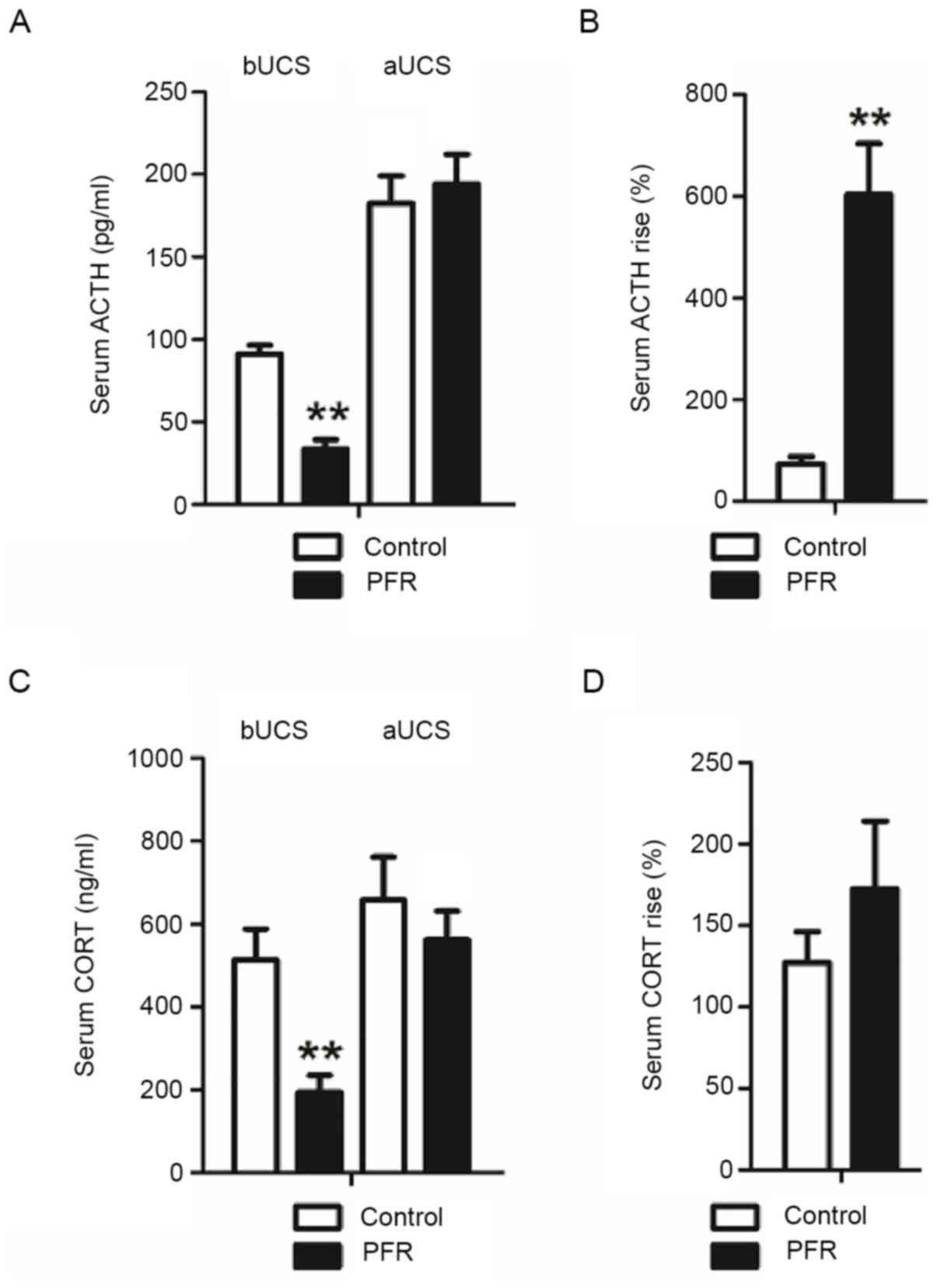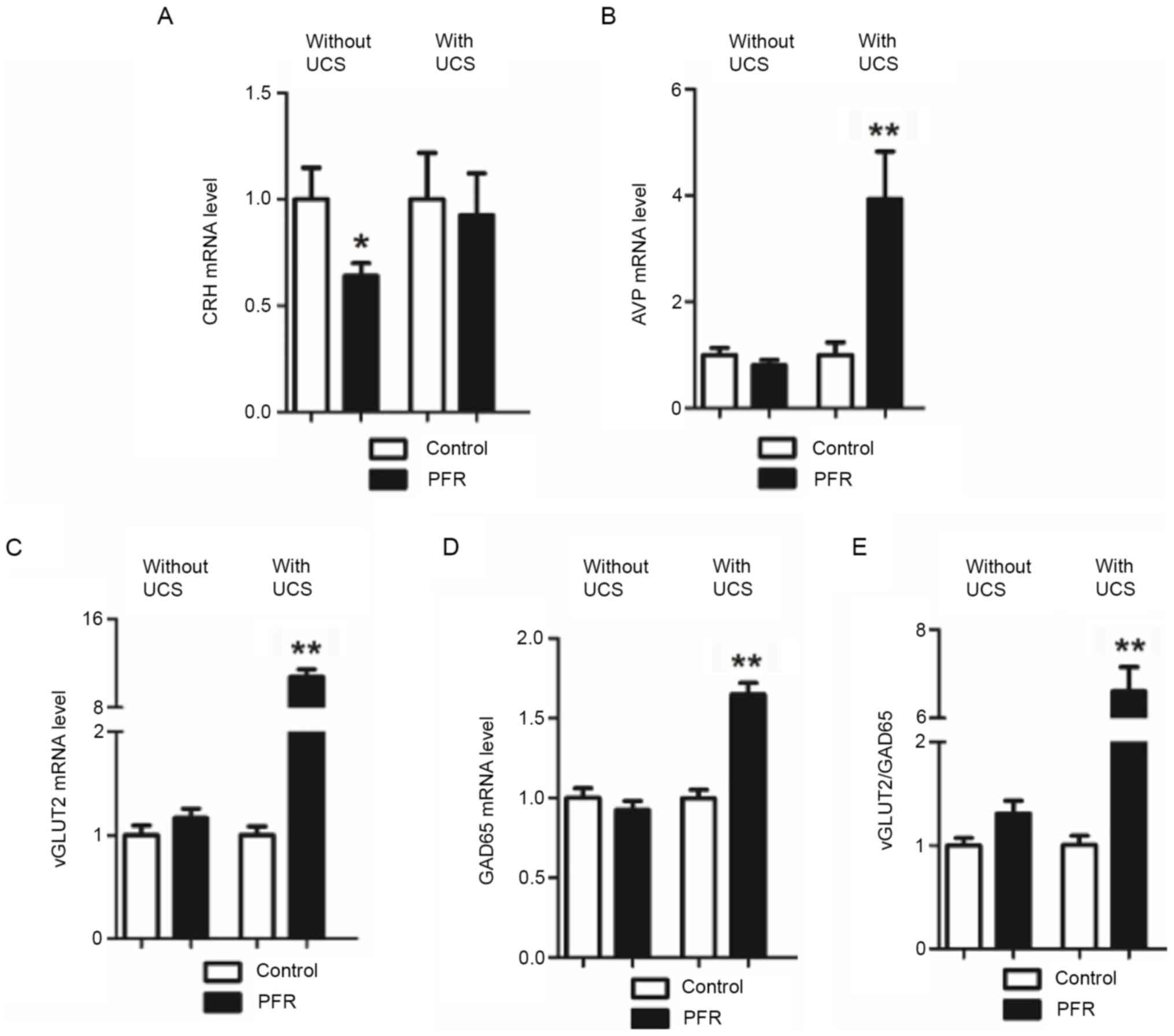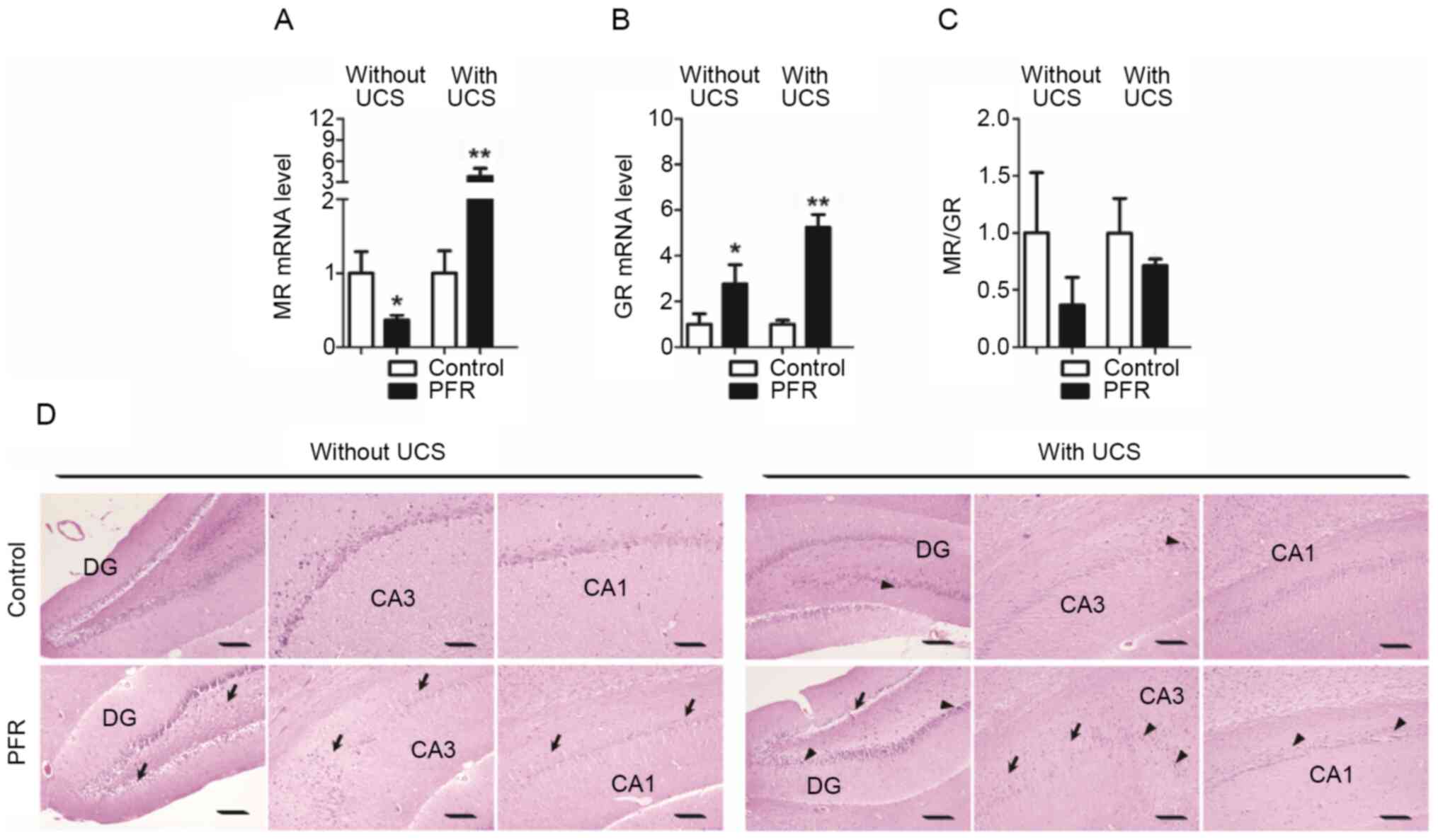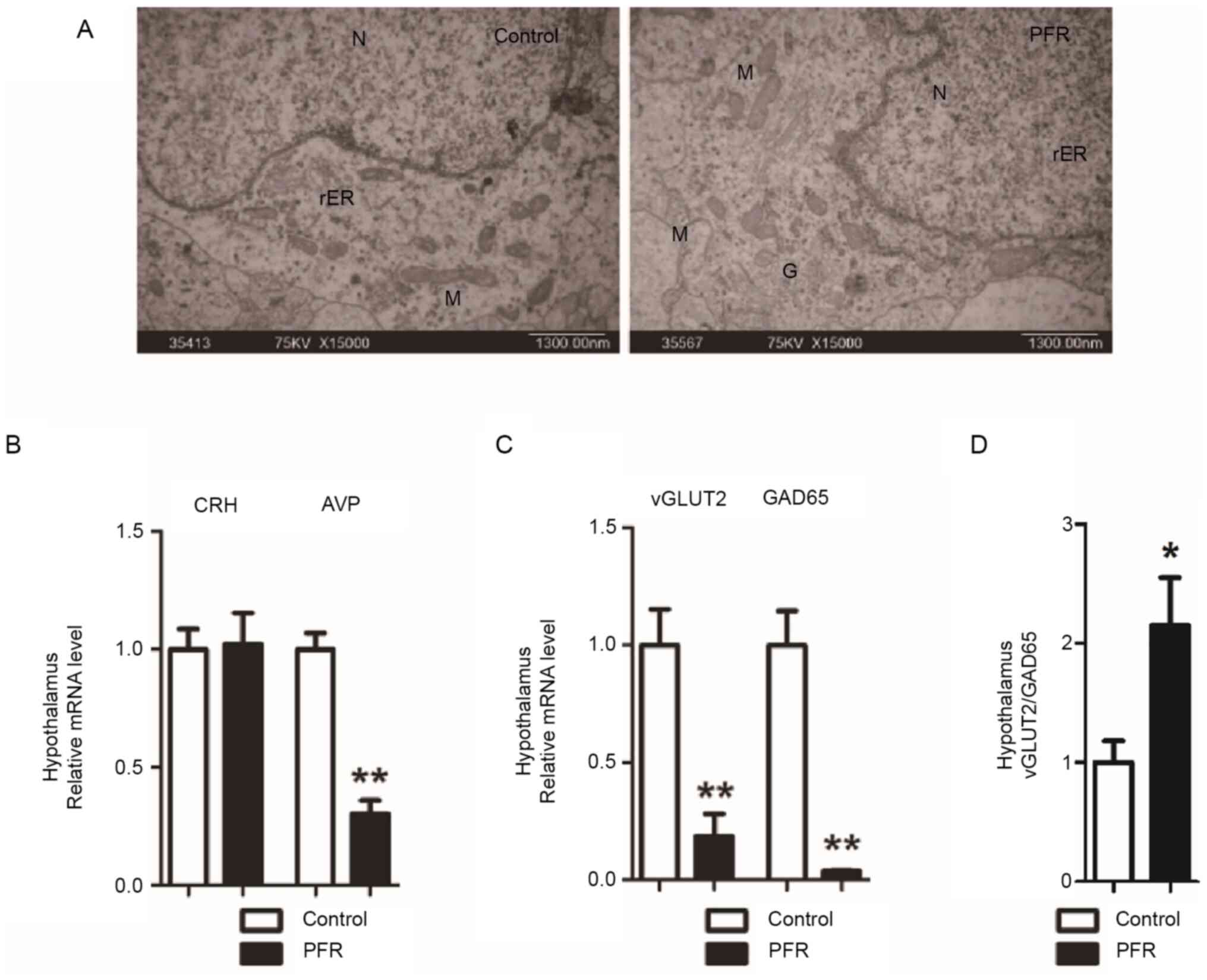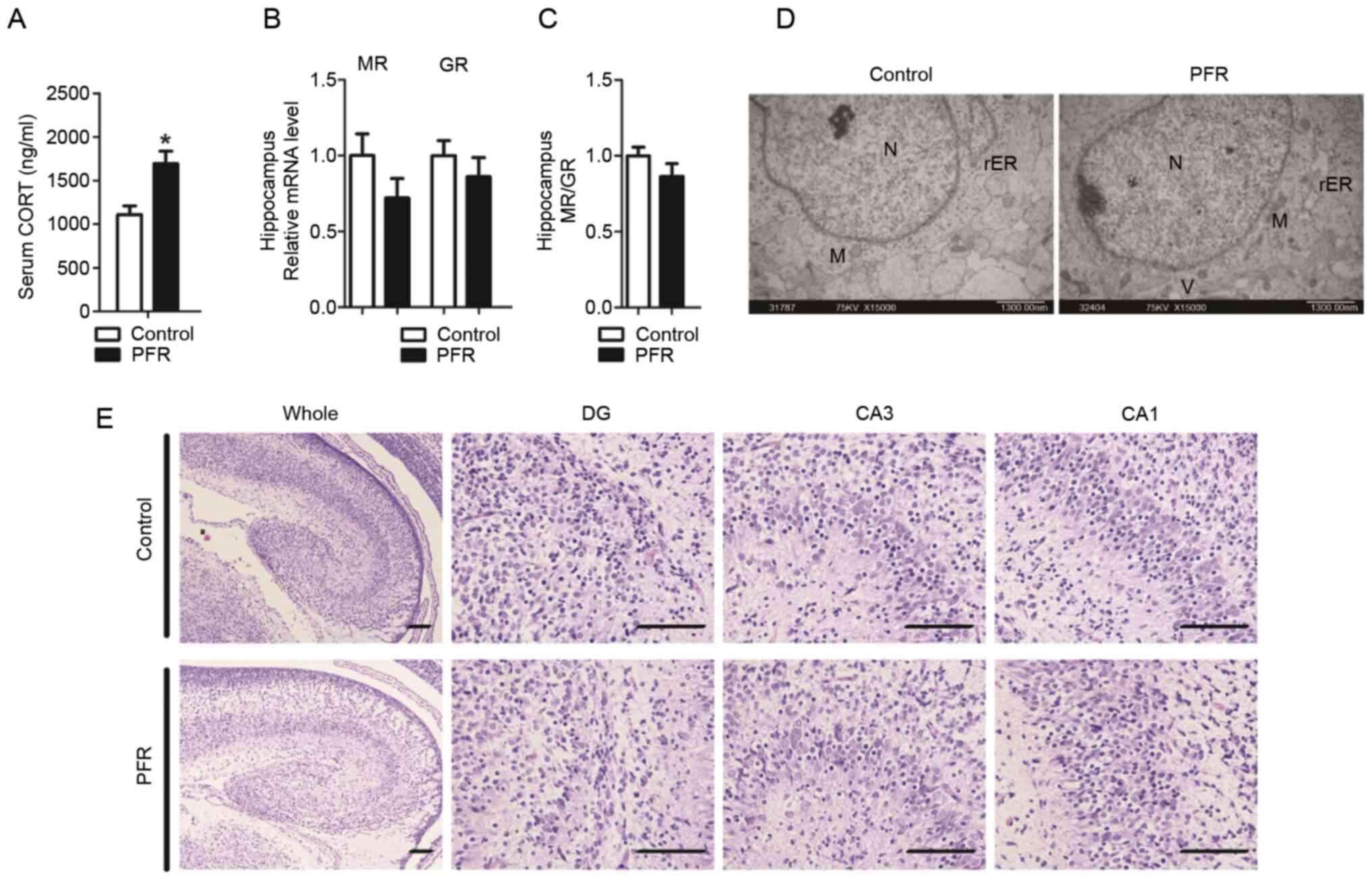|
1
|
Zhang C, Xu D, Luo H, Lu J, Liu L, Ping J
and Wang H: Prenatal xenobiotic exposure and intrauterine
hypothalamus-pituitary-adrenal axis programming alteration.
Toxicology. 325:74–84. 2014. View Article : Google Scholar : PubMed/NCBI
|
|
2
|
Barker DJ: The developmental origins of
chronic adult disease. Acta Paediatr Suppl. 93:26–33. 2004.
View Article : Google Scholar : PubMed/NCBI
|
|
3
|
Clark PM: Programming of the
hypothalamo-pituitary-adrenal axis and the fetal origins of adult
disease hypothesis. Eur J Pediatr. 157 (Suppl 1):S7–S10. 1998.
View Article : Google Scholar : PubMed/NCBI
|
|
4
|
Lesage J, Sebaai N, Leonhardt M,
Dutriez-Casteloot I, Breton C, Deloof S and Vieau D: Perinatal
maternal undernutrition programs the offspring
hypothalamo-pituitary-adrenal (HPA) axis. Stress. 9:183–198. 2006.
View Article : Google Scholar : PubMed/NCBI
|
|
5
|
Poore KR and Fowden AL: The effect of
birth weight on hypothalamo-pituitary-adrenal axis function in
juvenile and adult pigs. J Physiol. 547((Pt 1)): 107–116. 2003.
View Article : Google Scholar : PubMed/NCBI
|
|
6
|
Zhang L, Xu D, Zhang B, Liu Y, Chu F, Guo
Y, Gong J, Zheng X, Chen L and Wang H: Prenatal food restriction
induces a hypothalamic-pituitary-adrenocortical axis-associated
neuroendocrine metabolic programmed alteration in adult offspring
rats. Arch Med Res. 44:335–345. 2013. View Article : Google Scholar : PubMed/NCBI
|
|
7
|
Holsboer F and Ising M: Stress hormone
regulation: Biological role and translation into therapy. Annu Rev
Psychol. 61:81–109. 2010. View Article : Google Scholar : PubMed/NCBI
|
|
8
|
Tasker JG and Herman JP: Mechanisms of
rapid glucocorticoid feedback inhibition of the
hypothalamic-pituitary-adrenal axis. Stress. 14:398–406. 2011.
View Article : Google Scholar : PubMed/NCBI
|
|
9
|
National Research Council (US), .
Committee for the Update of the Guide for the Care Use of
Laboratory Animals: Guide for the Care and Use of Laboratory
Animals. (8th edition). National Academies Press. (Washington, DC).
2011.
|
|
10
|
Brenes Sáenz JC, Villagra OR and
Fornaguera Trías J: Factor analysis of forced swimming test,
sucrose preference test and open field test on enriched, social and
isolated reared rats. Behav Brain Res. 169:57–65. 2006. View Article : Google Scholar : PubMed/NCBI
|
|
11
|
Deacon RM and Rawlins JN: T-maze
alternation in the rodent. Nat Protoc. 1:7–12. 2006. View Article : Google Scholar : PubMed/NCBI
|
|
12
|
Ye J, McGinnis S and Madden TL: BLAST:
Improvements for better sequence analysis. Nucleic Acids Res 34
(Web Server Issue). W6–W9. 2006. View Article : Google Scholar : PubMed/NCBI
|
|
13
|
Livak KJ and Schmittgen TD: Analysis of
relative gene expression data using real-time quantitative PCR and
the 2(−Delta Delta C(T)) method. Methods. 25:402–408. 2001.
View Article : Google Scholar : PubMed/NCBI
|
|
14
|
Flak JN, Ostrander MM, Tasker JG and
Herman JP: Chronic stress-induced neurotransmitter plasticity in
the PVN. J Comp Neurol. 517:156–165. 2009. View Article : Google Scholar : PubMed/NCBI
|
|
15
|
Smith SM and Vale WW: The role of the
hypothalamic-pituitary-adrenal axis in neuroendocrine responses to
stress. Dialogues Clin Neurosci. 8:383–395. 2006. View Article : Google Scholar : PubMed/NCBI
|
|
16
|
Sebaai N, Lesage J, Breton C, Vieau D and
Deloof S: Perinatal food deprivation induces marked alterations of
the hypothalamo-pituitary-adrenal axis in 8-month-old male rats
both under basal conditions and after a dehydration period.
Neuroendocrinology. 79:163–173. 2004. View Article : Google Scholar : PubMed/NCBI
|
|
17
|
Hawkins P, Hanson MA and Matthews SG:
Maternal undernutrition in early gestation alters molecular
regulation of the hypothalamic-pituitary-adrenal axis in the ovine
fetus. J Neuroendocrinology. 13:855–861. 2001. View Article : Google Scholar : PubMed/NCBI
|
|
18
|
Vieau D, Sebaai N, Leonhardt M,
Dutriez-Casteloot I, Molendi-Coste O, Laborie C, Breton C, Deloof S
and Lesage J: HPA axis programming by maternal undernutrition in
the male rat offspring. Psychoneuroendocrinology. 32 (Suppl
1):S16–S20. 2007. View Article : Google Scholar : PubMed/NCBI
|
|
19
|
Leonhardt M, Lesage J, Croix D,
Dutriez-Casteloot I, Beauvillain JC and Dupouy JP: Effects of
perinatal maternal food restriction on pituitary-gonadal axis and
plasma leptin level in rat pup at birth and weaning and on timing
of puberty. Boil Reprod. 68:390–400. 2003. View Article : Google Scholar : PubMed/NCBI
|
|
20
|
Hawkins P, Steyn C, McGarrigle HH, Saito
T, Ozaki T, Stratford LL, Noakes DE and Hanson MA: Effect of
maternal nutrient restriction in early gestation on responses of
the hypothalamic-pituitary-adrenal axis to acute isocapnic
hypoxaemia in late gestation fetal sheep. Exp Physiol. 85:85–96.
2000. View Article : Google Scholar : PubMed/NCBI
|
|
21
|
Tegethoff M, Pryce C and Meinlschmidt G:
Effects of intrauterine exposure to synthetic glucocorticoids on
fetal, newborn, and infant hypothalamic-pituitary-adrenal axis
function in humans: A systematic review. Endocr Rev. 30:753–789.
2009. View Article : Google Scholar : PubMed/NCBI
|
|
22
|
Gohlke JM, Griffith WC and Faustman EM: A
systems-based computational model for dose-response comparisons of
two mode of action hypotheses for ethanol-induced
neurodevelopmental toxicity. Toxicol Sci. 86:470–484. 2005.
View Article : Google Scholar : PubMed/NCBI
|
|
23
|
Herman JP, Mueller NK and Figueiredo H:
Role of GABA and glutamate circuitry in
hypothalamo-pituitary-adrenocortical stress integration. Ann N Y
Acad Sci. 1018:35–45. 2004. View Article : Google Scholar : PubMed/NCBI
|
|
24
|
de Kloet ER, Meijer OC, de Nicola AF, de
Rijk RH and Joëls M: Importance of the brain corticosteroid
receptor balance in metaplasticity, cognitive performance and
neuro-inflammation. Front Neuroendocrinol. 49:124–145. 2018.
View Article : Google Scholar : PubMed/NCBI
|
|
25
|
Kozlovsky N, Matar MA, Kaplan Z, Zohar J
and Cohen H: A distinct pattern of intracellular
glucocorticoid-related responses is associated with extreme
behavioral response to stress in an animal model of post-traumatic
stress disorder. Eur Neuropsychopharmacol. 19:759–771. 2009.
View Article : Google Scholar : PubMed/NCBI
|
|
26
|
Treccani G, Musazzi L, Perego C, Milanese
M, Nava N, Bonifacino T, Lamanna J, Malgaroli A, Drago F, Racagni
G, et al: Stress and corticosterone increase the readily releasable
pool of glutamate vesicles in synaptic terminals of prefrontal and
frontal cortex. Mol Psychiatry. 19:433–443. 2014. View Article : Google Scholar : PubMed/NCBI
|
|
27
|
Matthews SG: Early programming of the
hypothalamo-pituitary-adrenal axis. Trends Endocrinol Metab.
13:373–380. 2002. View Article : Google Scholar : PubMed/NCBI
|
|
28
|
Sapolsky RM and Meaney MJ: Maturation of
the adrenocortical stress response: Neuroendocrine control
mechanisms and the stress hyporesponsive period. Brain Res.
396:64–76. 1986. View Article : Google Scholar : PubMed/NCBI
|
|
29
|
Krishnamurthy S, Garabadu D and Joy KP:
Risperidone ameliorates post-traumatic stress disorder-like
symptoms in modified stress re-stress model. Neuroendocrinology.
75:62–77. 2013.
|
|
30
|
Liao XM, Yang XD, Jia J, Li JT, Xie XM, Su
YA, Schmidt MV, Si TM and Wang XD: Blockade of
corticotropin-releasing hormone receptor 1 attenuates early-life
stress-induced synaptic abnormalities in the neonatal hippocampus.
Hippocampus. 24:528–540. 2014. View Article : Google Scholar : PubMed/NCBI
|
|
31
|
de Quervain DJ, Aerni A, Schelling G and
Roozendaal B: Glucocorticoids and the regulation of memory in
health and disease. Front Neuroendocrinol. 30:358–370. 2009.
View Article : Google Scholar : PubMed/NCBI
|
|
32
|
Arbel I, Kadar T, Silbermann M and Levy A:
The effects of long-term corticosterone administration on
hippocampal morphology and cognitive performance of middle-aged
rats. Brain Res. 657:227–235. 1994. View Article : Google Scholar : PubMed/NCBI
|
|
33
|
De Kloet ER, Vreugdenhil E, Oitzl MS and
Joëls M: Brain corticosteroid receptor balance in health and
disease. Endocr Rev. 19:269–301. 1998. View Article : Google Scholar : PubMed/NCBI
|
|
34
|
Arends N, Johnston L, Hokken-Koelega A,
van Duijn C, de Ridder M, Savage M and Clark A: Polymorphism in the
IGF-I gene: Clinical relevance for short children born small for
gestational age (SGA). J Clin Endocrinol Metab. 87:27202002.
View Article : Google Scholar : PubMed/NCBI
|
|
35
|
Qiu XS, Huang TT, Deng HY, Shen ZY, Ke ZY,
Mei KY and Lai F: Effects of early nutrition intervention on IGF1,
IGFBP3, intestinal development, and catch-up growth of intrauterine
growth retardation rats. Chin Med Sci J. 19:189–192.
2004.PubMed/NCBI
|
|
36
|
Thamotharan M, Shin BC, Suddirikku DT,
Thamotharan S, Garg M and Devaskar SU: GLUT4 expression and
subcellular localization in the intrauterine growth-restricted
adult rat female offspring. Am J Physiol Endocrinol Metab.
288:E935–E947. 2005. View Article : Google Scholar : PubMed/NCBI
|
|
37
|
Sloboda DM, Moss TJ, Li S, Matthews SG,
Challis JR and Newnham JP: Expression of glucocorticoid receptor,
mineralocorticoid receptor, and 11beta-hydroxysteroid dehydrogenase
1 and 2 in the fetal and postnatal ovine hippocampus: Ontogeny and
effects of prenatal glucocorticoid exposure. J Endocrinol.
197:213–220. 2008. View Article : Google Scholar : PubMed/NCBI
|
|
38
|
Tan Y, Liu J, Deng Y, Cao H, Xu D, Cu F,
Lei Y, Magdalou J, Wu M, Chen L and Wang H: Caffeine-induced fetal
rat over-exposure to maternal glucocorticoid and histone
methylation of liver IGF-1 might cause skeletal growth retardation.
Toxicol Lett. 214:279–287. 2012. View Article : Google Scholar : PubMed/NCBI
|
|
39
|
Xu D, Chen M, Pan XL, Xia LP and Wang H:
Dexamethasone induces fetal developmental toxicity through
affecting the placental glucocorticoid barrier and depressing fetal
adrenal function. Environ Toxicol Pharmacol. 32:356–363. 2011.
View Article : Google Scholar : PubMed/NCBI
|
|
40
|
Chen M, Wang T, Liao ZX, Pan XL, Feng YH
and Wang H: Nicotine-induced prenatal overexposure to maternal
glucocorticoid and intrauterine growth retardation in rat. Exp
Toxicol Pathol. 59:245–251. 2007. View Article : Google Scholar : PubMed/NCBI
|
|
41
|
Xu D, Zhang B, Liang G, Ping J, Kou H, Li
X, Xiong J, Hu D, Chen L, Magdalou J and Wang H: Caffeine-induced
activated glucocorticoid metabolism in the hippocampus causes
hypothalamic-pituitary-adrenal axis inhibition in fetal rats. PLoS
One. 7:e444972012. View Article : Google Scholar : PubMed/NCBI
|















